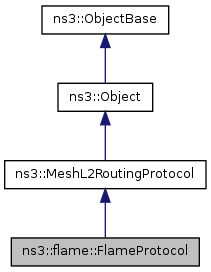FLAME routing protocol. More...
#include <flame-protocol.h>


Public Member Functions | |
| void | DoDispose () |
| bool | RequestRoute (uint32_t sourceIface, const Mac48Address source, const Mac48Address destination, Ptr< const Packet > packet, uint16_t protocolType, RouteReplyCallback routeReply) |
| Route request, inherited from MeshL2RoutingProtocol. | |
| bool | RemoveRoutingStuff (uint32_t fromIface, const Mac48Address source, const Mac48Address destination, Ptr< Packet > packet, uint16_t &protocolType) |
| Cleanup flame headers! | |
| bool | Install (Ptr< MeshPointDevice >) |
| Install FLAME on given mesh point. | |
| void | Report (std::ostream &) const |
| Statistics. | |
Static Public Member Functions | |
| static TypeId | GetTypeId () |
| Never forget to support NS3 object model. | |
Private Member Functions | |
| bool | HandleDataFrame (uint16_t seqno, Mac48Address source, const FlameHeader flameHdr, Mac48Address receiver, uint32_t fromIface) |
| Handles a packet: adds a routing information and drops packets by TTL or Seqno. | |
Private Attributes | |
| uint8_t | m_maxCost |
| Max Cost value (or TTL, because cost is actually hopcount). | |
| uint16_t | m_myLastSeqno |
| Sequence number: | |
| Ptr< FlameRtable > | m_rtable |
| Routing table: | |
Broadcast timers: | |
| Time | m_broadcastInterval |
| Time | m_lastBroadcast |
Statistics: | |
| Statistics | m_stats |
Static Private Attributes | |
| static const uint16_t | FLAME_PROTOCOL = 0x4040 |
| LLC protocol number reserved by flame. | |
Information about MeshPointDeviceaddress, plugins | |
|
| |
|
typedef std::map< uint32_t, Ptr< FlameProtocolMac > > | FlamePluginMap |
| FlamePluginMap | m_interfaces |
| Mac48Address | m_address |
Detailed Description
FLAME routing protocol.
Member Function Documentation
| void ns3::flame::FlameProtocol::DoDispose | ( | ) | [virtual] |
This method is called by Object::Dispose or by the object's destructor, whichever comes first.
Subclasses are expected to implement their real destruction code in an overriden version of this method and chain up to their parent's implementation once they are done. i.e., for simplicity, the destructor of every subclass should be empty and its content should be moved to the associated DoDispose method.
Reimplemented from ns3::Object.
| static TypeId ns3::flame::FlameProtocol::GetTypeId | ( | void | ) | [static] |
Never forget to support NS3 object model.
This method returns the TypeId associated to ns3::MeshL2RoutingProtocol.
This object is accessible through the following paths with Config::Set and Config::Connect:
- /NodeList/[i]/DeviceList/[i]/$ns3::MeshPointDevice/RoutingProtocol
No Attributes defined for this type.
No TraceSources defined for this type.
Reimplemented from ns3::MeshL2RoutingProtocol.
| bool ns3::flame::FlameProtocol::HandleDataFrame | ( | uint16_t | seqno, | |
| Mac48Address | source, | |||
| const FlameHeader | flameHdr, | |||
| Mac48Address | receiver, | |||
| uint32_t | fromIface | |||
| ) | [private] |
Handles a packet: adds a routing information and drops packets by TTL or Seqno.
- Returns:
- true if packet shall be dropped
| bool ns3::flame::FlameProtocol::Install | ( | Ptr< MeshPointDevice > | ) |
Install FLAME on given mesh point.
Installing protocol cause installing its interface MAC plugins.
Also MP aggregates all installed protocols, FLAME protocol can be accessed via MeshPointDevice::GetObject<flame::FlameProtocol>();
The documentation for this class was generated from the following file:
- src/devices/mesh/flame/flame-protocol.h
 1.7.1
1.7.1